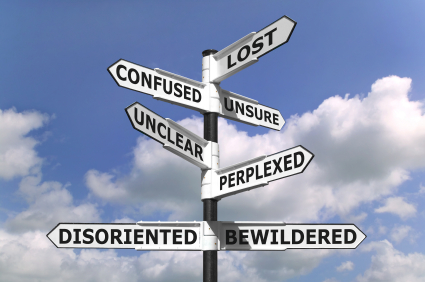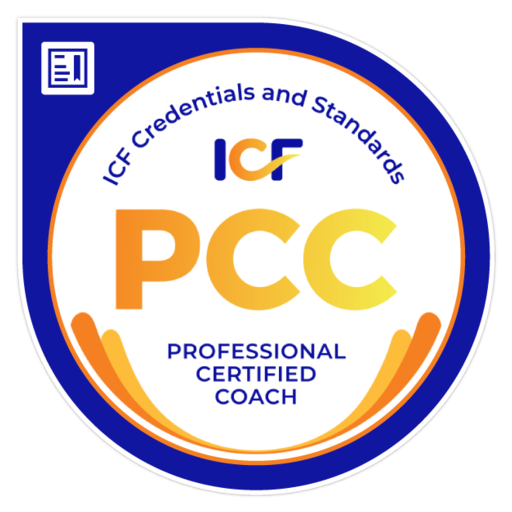 Have you noticed yourself feeling two ways simultaneously? In language arts two incongruous or seemingly contradictory terms appearing together are called an oxymoron, like Great Depression or Silent Scream. But there doesn’t seem to be one word that describes the ambiguity that is an inevitable part of our daily lives, both personally at in the workplace. One of my own greatest ambiguities is that when I visit my family and childhood home in Germany, I never really feel at home. My home is here now, yet I want to be there and miss it when I am away. Your incongruity will be different. You may love someone to pieces, but they are the one who gets on your last nerve and with whom you fight most hurtfully. Or perhaps you’ve gone on something like the chocolate chip cookie diet. How can that be a diet at all? Workplace ambiguities are equally strong and sometimes confusing: we continue to work for a boss that we hate, fail to look for another job though we know that a lay off is inevitable, take time off when we know that we are needed to complete a project or that we are near the end of annual allowed time off. Ambiguity is a part of life, embrace it.
Have you noticed yourself feeling two ways simultaneously? In language arts two incongruous or seemingly contradictory terms appearing together are called an oxymoron, like Great Depression or Silent Scream. But there doesn’t seem to be one word that describes the ambiguity that is an inevitable part of our daily lives, both personally at in the workplace. One of my own greatest ambiguities is that when I visit my family and childhood home in Germany, I never really feel at home. My home is here now, yet I want to be there and miss it when I am away. Your incongruity will be different. You may love someone to pieces, but they are the one who gets on your last nerve and with whom you fight most hurtfully. Or perhaps you’ve gone on something like the chocolate chip cookie diet. How can that be a diet at all? Workplace ambiguities are equally strong and sometimes confusing: we continue to work for a boss that we hate, fail to look for another job though we know that a lay off is inevitable, take time off when we know that we are needed to complete a project or that we are near the end of annual allowed time off. Ambiguity is a part of life, embrace it.
I wanted a perfect ending. Now I’ve learned, the hard way, that some poems don’t rhyme, and some stories don’t have a clear beginning, middle, and end. Life is about not knowing, having to change, taking the moment and making the best of it, without knowing what’s going to happen next. Delicious Ambiguity.
~Gilda Radner
Philosophy is filled with discussions of life’s existential ambiguities. Simone de Beauvoir, in The Ethics of Ambiguity (1947), wrote that “From the very beginning, existentialism defined itself as a philosophy of ambiguity. … Sartre in Being and Nothingness, fundamentally defined man, that being whose being is not to be, that subjectivity which realizes itself only as a presence in the world.” These philosophical unanswered anomalies will be with us throughout our lives, now in the past and in the future. They are life’s imponderables.
Some ambiguities, however, are more concrete and rational, particularly in the workplace. Take the example of a manager who knows that her department is being downsized, but does nothing to find a niche somewhere else within her company or to find another job. How can that be? Faced with knowledge that she is about to faced with unemployment, she seeks no back-up plan and chooses to stay the course and take no affirmative action on her own behalf.
Have you ever faced a moral dilemma at work such as being asked to do something immoral or illegal? This type of dilemma can be large or small, have serious ramifications or none at all. Nevertheless, the ambiguity puts you in an untenable position because you are stuck with the dual obligation: one to yourself and the other to your boss or company. This might occur:
- If you know another employee steals money or tips or falsifies an expense report
- If your supervisor asks you to lie about why a project was incomplete
- In an extreme case, if you are asked to lie about a safety hazard or dump toxic waste
- If you are asked to take a negative job action against someone who you think is capable
If, indeed, you are faced with such ambiguities at work, here are some steps you can take to help.
Accept and acknowledge the conflict. Maybe the manager faced with losing her job realizes she is doing nothing to ameliorate the situation, but decides she’s ok with that. She knows that she will be unemployed but acknowledges that she is not ready to move forward on her own behalf. If you know that someone else is falsifying reports otherwise acting immorally, define the problem and ask yourself whether you should get involved.
Trust in yourself and the universe. For me, when I face an ambiguity, I believe that my mind guide by my Higher Self will take me to a place where I am comfortable with the conflict and ultimately guide me to know what, if anything, to do. I will live with the problem for a while and let it foment before taking action. The other part of trust, for me, is my faith and spiritual belief that the universe will sort things out with time. I use this trust and knowledge to comfort myself while the problem sorts itself out.
Create financial reserves. If you are in a truly difficult ambiguous situation at work, you may need to remove yourself entirely. If your boss is asking you to dump toxic waste, put a hood up in a laboratory to make it look like there is proper ventilation when there is not, put a co-worker at risk, or terminate someone for personal, rather than business-based reasons, you may decide that your workplace is untenable for you, that you cannot and will not live with that conflict between your morality and reality. In that case, having financial reserves will provide you with a meaningful option.
Be healthy and take care of yourself. Remember, you are number one. If the ambiguity in your life is preventing you from sleeping, making you anxious, causing you to hate going to work, then you are not in a healthy situation. You must change it. You must think in terms of what is best for you and take care of yourself.
I love this quote from Sydney J. Harris In Clearing Ground (1986):
The acceptance of ambiguity implies more than the commonplace understanding that some good things and some bad things happen to us. It means that we know that good and evil are inextricably intermixed in human affairs; that they contain, and sometimes embrace, their opposites; that success may involve failure of a different kind, and failure may be a kind of triumph.
So let’s all remember, life is unclear. It’s sometimes dirty and often murky. Our experiences are not meant to be one dimensional because dimension and challenge and even ambiguity all add to the richness of life.




